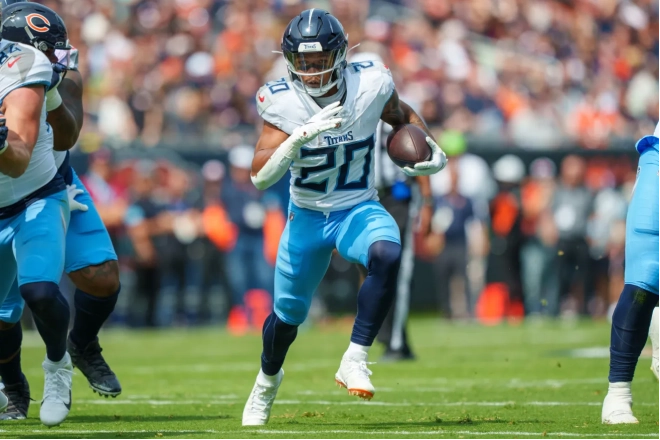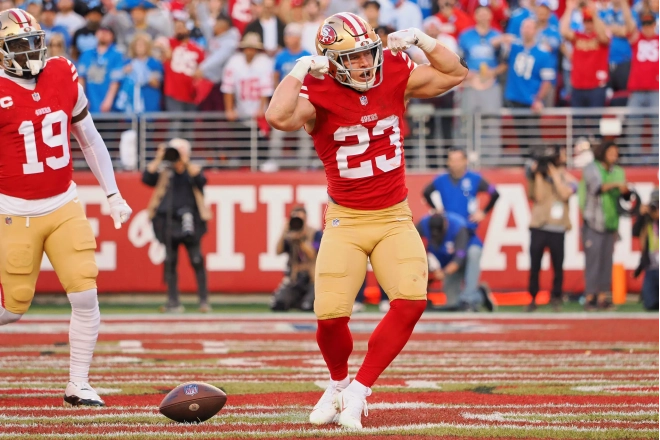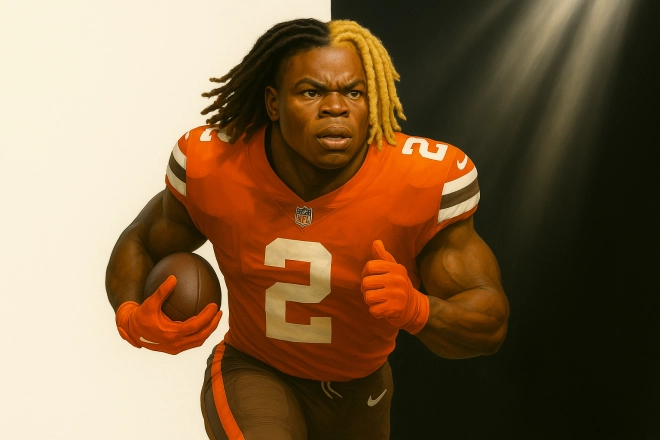Everything I’ve read about the Browns lately has only reinforced one thing: this is a franchise in utter disarray. In our dynasty league, they’re the laughingstock. Anyone who picks up a Cleveland player gets ridiculed — unless they got them at a deep discount.
I happen to have Jerome Ford on my roster. And if our rookie draft had played out just a little differently, I could have easily ended up with Quinshon Judkins, who I believed was one of the most talented RBs in this year’s class.
And of course, the Browns are still living in the shadow of what many — myself included — consider the worst trade in NFL history: Deshaun Watson for not one, not two, but three first-round picks. The thing is, anyone who follows the NFL knew it was a bad deal — even if Watson had performed near the top end of the Browns' front office expectations (not the fans’).
To make matters worse, Shedeur Sanders’ character concerns were well-documented before the draft. Despite his talent, he slid all the way to the fifth round, where Cleveland picked him up — and he’s already made headlines for off-the-field shenanigans. I found myself shaking my head, wondering: How does one organization keep making the same mistakes?
And now, Judkins — already in a contract dispute before taking a single snap. His career isn’t over (yet), but with Cleveland’s track record, you almost expect the worst. Will the Browns ever learn?
Another Offseason Headline — Another Gut Punch in Berea
The Cleveland Browns can’t seem to catch a break — or perhaps they don’t deserve one.
On July 10th, rookie running back Quinshon Judkins, the team’s second-round draft pick and presumed successor to Jerome Ford, was arrested in Fort Lauderdale on charges of domestic battery. Though the details remain sparse, the arrest came before Judkins had even signed his rookie contract — throwing a wrench into the Browns’ depth chart, their image, and their already fragile locker room culture.
To many fans, this might feel like déjà vu. In fact, it is.
For the second consecutive offseason, a Browns rookie has found himself in legal trouble. And Judkins’ arrest is only the latest entry in a growing list of off-field incidents that have plagued the franchise in recent years.
So the question must be asked — is this just bad luck, or has Cleveland built a culture that tolerates — even attracts — this kind of turmoil?
The Judkins Draft Pick — Did the Browns Miss Something?
To be fair, Judkins wasn’t flagged for character concerns by most analysts ahead of the 2025 NFL Draft. He had a clean record at Ole Miss and Ohio State, where he was known more for his tough running style than any off-field drama. When the Browns used the 36th overall pick on him, it was seen as a shrewd value move — a way to restock their backfield at a bargain.
But that assumption has now exploded into a public relations mess. Whether Judkins’ legal situation resolves quickly or lingers into training camp, the damage is already done. Once again, the Browns are facing scrutiny — not just for what happened, but for whether they should have seen it coming.
Did Cleveland do its homework? Did they overlook behavioral red flags, or was this an unforeseeable incident? And most critically: should a team with the Browns’ recent history of player misconduct have taken a more cautious approach?
Given the storm already brewing around the Deshaun Watson contract, the Devin Bush arrest, and the locker room churn over the last three years — prudence might have been the better part of valor.
A Timeline of Trouble — When Smoke Becomes Fire
If Quinshon Judkins were an isolated incident, it might be written off as a fluke — an unfortunate but rare misstep in an otherwise disciplined organization.
But that’s not the case.
Over the past three years, the Browns have become frequent flyers in the league’s transaction wire and police blotter. While other teams occasionally deal with off-field issues, the Browns’ situation has begun to feel systemic.
Here’s a short list of recent headlines:
July 2025 — Judkins arrested for domestic battery before signing rookie contract.
June 2025 — Rookie QB Shedeur Sanders caught speeding twice, once at 101 mph.
May 2025 — Linebacker Devin Bush Jr. arrested on assault charges in Pennsylvania.
2025 — Kadarius Toney arrested for aggravated assault; waived months earlier.
2024 — DT Michael Hall Jr. suspended five games for personal conduct violations.
2024 — Lonnie Phelps released after DUI crash into a Florida restaurant.
2023 — Perrion Winfrey released after allegedly threatening a woman with a firearm.
This isn’t just bad optics — it’s a pattern. One that suggests either the Browns are remarkably unlucky, or repeatedly willing to tolerate red flags in the name of potential.
The Watson Effect — When the Top Sets the Tone
No player better represents the Browns’ risk tolerance than Deshaun Watson.
In 2022, Cleveland traded away three first-round picks and handed Watson a fully guaranteed $230 million contract — despite 20+ women filing lawsuits accusing him of sexual misconduct. Though Watson was never criminally charged, the NFL suspended him for 11 games and fined him $5 million for violating its personal conduct policy.
The message to the locker room — and the league — was loud and clear: If you're talented enough, Cleveland will look the other way.
That kind of decision doesn’t just affect media coverage. It affects locker room culture, free-agent perception, and even how rookies interpret the expectations placed upon them. When ownership and the front office gamble so heavily on a player with known character concerns, it sets a tone that reverberates through the organization.
Even now, with Watson injured again and his performance declining, the Browns are financially handcuffed — unable to pivot easily without eating tens of millions in dead cap space.
And that decision still hangs like a fog over everything else.
High Risk, Low Return — Is This a Management Problem?
Let’s be clear: not every troubled player came with known red flags. Some, like Judkins or Bush Jr., may have hidden issues no front office could reasonably detect. Others, like Perrion Winfrey or Toney, were well-known gambles.
That’s where the scrutiny must shift to Cleveland’s front office.
Have they been too aggressive with high-risk, high-reward prospects?
Have they undervalued team chemistry and character when building the roster?
Have they tried to outsmart the league, only to outplay themselves?
Fans might remember how former GM John Dorsey was similarly bold — drafting Baker Mayfield No. 1 overall, signing Kareem Hunt fresh off suspension, and rolling the dice on Odell Beckham Jr. But those moves, at least, had a brief moment of promise.
This current regime? It's yet to prove that its gambles will ever pay off.
Bad Luck or Bad Culture?
Every franchise deals with adversity. Injuries happen. Arrests happen. Draft busts happen.
But when they stack up this consistently, the conversation shifts from coincidence to culture.
The Browns have arguably been the most drama-prone franchise in football over the last five years, and it's no longer just about losing records or quarterback controversies. It’s about a pattern of tolerance — an organizational willingness to roll the dice on troubled talent, again and again, without apparent course correction.
That doesn’t mean every issue could have been avoided. Not every incident is foreseeable, and even the best organizations miss things. But when the same team repeatedly deals with legal problems, suspensions, and character-related busts, it becomes fair to ask:
Is this bad luck… or the natural result of bad choices?
The uncomfortable answer may be: both.
What Happens Now?
The Browns face yet another crossroads. Judkins' arrest raises immediate questions:
Do they proceed with signing him?
Should they?
Can the franchise afford to take another public relations hit — let alone a locker room one?
And even beyond Judkins, broader questions remain:
Will Shedeur Sanders’ behavior come under closer scrutiny if he struggles?
Will Deshaun Watson ever return to form, and if not, how long will Cleveland cling to hope?
Can the front office re-establish credibility in future drafts and free-agent signings?
It’s not just about this season anymore. It’s about whether the Browns can course-correct an identity that seems increasingly defined by chaos, rather than competitiveness.
Conclusion — Culture Eats Talent for Breakfast
The Cleveland Browns have talent. They always seem to. But talent, as the old saying goes, is not enough.
Culture wins in this league. It’s why the Ravens remain stable. It’s why the Steelers weather down years. It’s why the Chiefs, Eagles, and 49ers have built lasting contenders.
If Cleveland wants to escape its own shadow, it needs more than stars — it needs standards.
Until then, the front office can keep blaming bad luck. But the rest of the league knows better.
Because when this much goes wrong, this often, it stops being a curse.
And starts being a choice.
At some point, you have to wonder: when will the Browns finally say, “enough is enough”?
To get a fuller picture of all the fantasy relevant Browns players, check out Kevin Campbell's article: Relevant Players: Cleveland Browns





